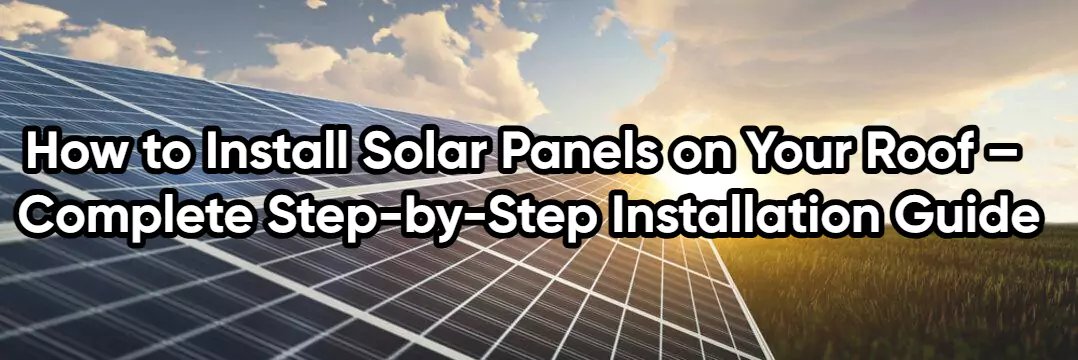
How to Install Solar Panels on Your Roof – Complete Step-by-Step Installation Guide
Want to install solar panels on your roof? This step-by-step guide walks you through the entire solar installation process—from evaluating your roof’s suitability and choosing the right solar system to panel mounting, wiring, inverter setup, and system monitoring. Learn how to ensure a safe, efficient, and cost-effective rooftop solar installation for your home or business.
Step-by-Step Guide to Installing Solar Panels on Your Roof
Looking to power your home with solar energy? Here’s a detailed, SEO-optimized guide on how to install solar panels on your rooftop—from roof assessment to energy savings.
✅ 1. Assess Your Roof’s Suitability
Evaluate your roof’s orientation, size, shading, and structural strength. A north-facing roof with minimal shade is ideal for maximum solar output.
✅ 2. Calculate Your Energy Needs
Review your average monthly energy consumption to determine the required solar system size. Consider future usage increases (e.g., EV charging or home appliances).
✅ 3. Choose the Right Solar Panels
Select high-efficiency solar panels that suit your energy needs and budget. Prioritize reputable brands offering strong warranties and long-term performance.
✅ 4. Secure Permits and Approvals
Apply for necessary solar permits, including building approvals and utility interconnection. Local regulations may vary, so check with your municipality.
✅ 5. Prepare Equipment and Tools
Gather essential components:
Solar panels
Mounting structures
Inverters or microinverters
Wiring, safety switches, and grounding tools
✅ 6. Prepare the Roof
Clean and inspect the roof surface. Repair any leaks or damage and ensure it can support the added weight of solar panels.
✅ 7. Install Mounting System
Install the mounting rails or brackets as per manufacturer guidelines. Ensure accurate alignment and secure fixing to withstand wind and weather.
✅ 8. Mount the Solar Panels
Attach solar panels to the mountings using bolts and clamps. Follow correct orientation and tilt angle for optimal sun exposure.
✅ 9. Complete Electrical Wiring
Connect solar panels to the inverter and your home’s main electrical panel. Always follow local electrical codes and safety protocols.
✅ 10. Install Inverter or Microinverters
Install the inverter(s) to convert DC power to AC power for home use. Place in a cool, ventilated area for best performance.
✅ 11. Grounding and Safety Checks
Properly ground the solar system to protect against electric shocks and system faults. Bond all metallic components as per standards.
✅ 12. Conduct Final Inspection
Ensure all panels, wiring, and components are securely installed. Schedule a professional inspection if required by your local utility or building authority.
✅ 13. Connect to the Power Grid
Apply for grid interconnection approval from your utility provider. Once approved, your system can send excess power back to the grid.
✅ 14. Monitor System Performance
Use a solar monitoring app or dashboard to track energy output, system health, and savings in real time.
✅ 15. Start Saving with Solar
Enjoy clean, renewable energy while reducing your electricity bills and carbon footprint. You may also benefit from net metering and government incentives.
⚠️ Important Note:
Always consult certified solar installers and follow local regulations, safety standards, and manufacturer instructions for a successful and safe installation.
